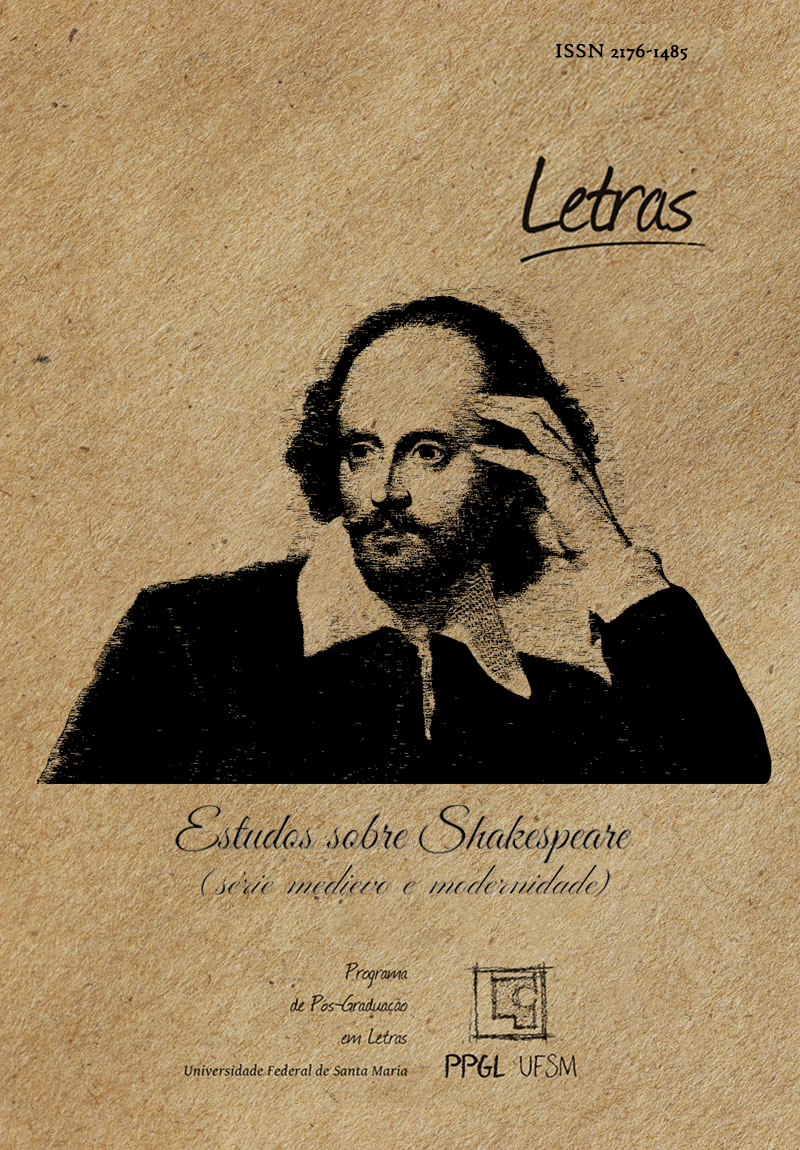‘Being strong on both sides’: Shakespearean heroines equivocations
DOI:
https://doi.org/10.5902/2176148573571Parole chiave:
Shakespeare, Equivocation, Henry Garnet, Truth and lyingAbstract
In the sixteenth century, politico-religious persecution led English Catholics to develop a technique for dealing with Protestant inquiries while avoiding the sin of perjury. Conceived by Henry Garnet in his Treatise of Equivocation, the practice consisted of formulating sentences that were always true but had two different meanings: one easy to understand but false; the other true but complex and hidden. This article investigates how some Shakespearean heroines explore this technique to answer questions in distressing situations. As the persecuted politico-religious minority did in history these misguided heroines seek to protect themselves or those whom they love in the plays.
Downloads
Riferimenti bibliografici
ABBOT, G. Quaestiones sex totidem praelectionibus. Schola Theologica, Oxoniae. Oxford: Joseph Barnes, 1598.
AZPICUELTA, M. de. Commentarius in cap. Humanae aures, XXII. Q. V. De Veritate Responsi; Partim verbo expresso, Partim mente concepto redditi. I. U. D. Praeclarissimi Commentaria. Vol. I. Venice: 1584.
CLARK, G. C.: Augustine on Love and Fellow Feeling. In.: CASTON, Ruth R.; KASTER, Robert A. Hope, Joy, and Affection in the Classical World. Oxford: Oxford University Press, 2016, p. 209-225. DOI: https://doi.org/10.1093/acprof:oso/9780190278298.003.0011
CONDREN, C. Unfolding the ‘properties of government’: the case of Measure for Measure and the history of political thought. In.:
ARMITAGE, David; CONDREN, Conal; FITZMAURICE, Andrew (ed’s). Shakespeare and Early Modern Political Thought. Cambridge: Cambridge University Press, 2009, p. 157-175. DOI: https://doi.org/10.1017/CBO9780511635328
CURRAN JR., JOHN E. That Suggestion: Catholic Casuistry, Complexity, and Macbeth. Religions, v. 9, p. 315, 2018. DOI: https://doi.org/10.3390/rel9100315
DUTTON, R. Shakespeare: Court Dramatist. Oxford: Oxford University Press, 2016. DOI: https://doi.org/10.1093/acprof:oso/9780198777748.001.0001
FRASER, A. The Gunpowder Plot: Terror and Faith in 1605. London: Mandarin, 1997.
GARDINER, S. R. History of England: from the accession of James I to the outbreak of the civil war, 1603-1642. 10 volumes. London: London, Longmans, Green and Co, 1900.
GARNET, H. Treatise of Equivocation. Edited by David Jardine. London: Longman, Brown, Green and Longmans, 1851.
GREENBLATT, S. Will in the World: How Shakespeare became Shakespeare. New York: Norton and Company, 2004.
HADFIELD, A. Lying in Early Modern English Culture: From the Oath of Supremacy to the Oath of Allegiance. Oxford: Oxford University Press, 2017. DOI: https://doi.org/10.1093/oso/9780198789468.003.0003
KLAUSE, J. Shakespeare, the Earl and the Jesuit. Madison and Teaneck NJ: Fairleigh Dickinson University Press, 2008.
PATTERSON, W. B. King James VI and I and the Reunion of Christendom. Cambridge: Cambridge University Press, 1997. DOI: https://doi.org/10.1017/CBO9780511560774
SHAKESPEARE, W. Macbeth. Edited by Sandra Clark and Pamela Mason. Arden Third Series. London: Bloomsbury, 2015.
SHAKESPEARE, W. The Oxford Shakespeare. General editors Stanley Wells and Gary Taylor. Oxford: Oxford University Press, 1988.
SKINNER, Q. Shakespeare and humanist culture. In.: ARMITAGE, David; CONDREN, Conal; FITZMAURICE, Andrew (ed’s). Shakespeare and Early Modern Political Thought. Cambridge: Cambridge University Press, 2009, p. 271-281. DOI: https://doi.org/10.1017/CBO9780511635328.015
VINCE, M. From “Aequivocatio” to the “Jesuitical Equivocation”: The Changing Concepts of Ambiguity in Early Modern England. PhD thesis, University of Warwick, Department of English and Comparative Literary Studies, 2013.
WAKE, P. ‘‘A monster shapeless’: equivocation and the treasonous imagination’. Textual Practice, n. 25 (5), p. 941-960, 2011. DOI: https://doi.org/10.1080/0950236X.2011.597126
WIGGINS, M.; RICHARDSON, C. British Drama, 1533-1642: a catalogue. 10 vol. Oxford: Oxford University Press, 2007-actual.
WILLS, G. Witches and Jesuits: Shakespeare’s Macbeth. Oxford: Oxford University Press, 1995.
##submission.downloads##
Pubblicato
Come citare
Fascicolo
Sezione
Licenza
Copyright (c) 2024 Letras

Questo lavoro è fornito con la licenza Creative Commons Attribuzione - Non commerciale - Condividi allo stesso modo 4.0 Internazionale.
Ficam concedidos a Letras todos os direitos autorais referentes aos trabalhos publicados. Os originais não devem ter sido publicados ou submetidos simultaneamente a outro periódico e não serão devolvidos. Em virtude de aparecerem nesta revista de acesso público, os artigos são de uso gratuito, com atribuições próprias, em aplicações educacionais e não comerciais.






